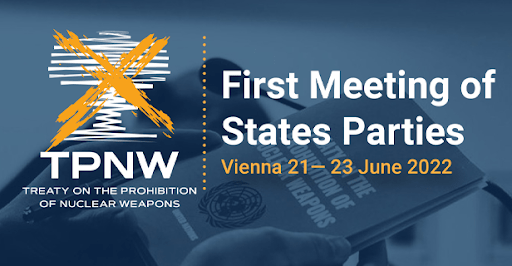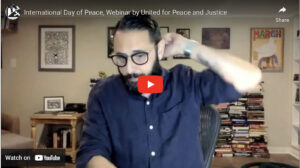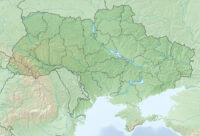By Matt De Vlieger, former UFPJ National Coordinator, reporting from Vienna
From June 21-23 the First Meeting of States Parties to the Treaty on the Prohibition of Nuclear Weapons (TPNW) was held at the United Nations in Vienna, with friends, allies, and members of UFPJ groups in attendance. It’s the first time member states met since the TPNW (also known as the Nuclear Ban Treaty) was negotiated in 2017, following ratification by 50 governments. The nine nuclear armed states and their allies have, for the most part, boycotted the TPNW and refused to acknowledge its significance. However, U.S. allies Germany, the Netherlands, Belgium, and Australia sent observers to this First Meeting of States Parties (1MSP).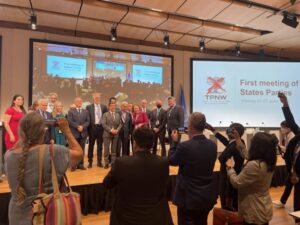
In harmony with 1MSP, The International Campaign to Abolish Nuclear Weapons (ICAN) hosted a Nuclear Ban Week in Vienna which began the weekend prior and included four stages, 40 events, over 100 speakers, and 1400 participants in person and online.
The coming together of “multiple organizations across geographies and addressing
different issues that are connecting…galvanizes our power and our strength and our imagination, really to push for states to fight for the adoption of the treaty by non-participatory states”, said Karlene Griffiths Sekou, Massachusetts based Director of Healing Justice and Global Village for Black Lives Matter Grassroots, who was invited as a speaker.
The ICAN conference was followed by a conference on the humanitarian impacts of nuclear weapons, hosted by the Austrian government, and a parliamentary conference for supporters of the TPNW, just prior to the official 1MSP, which was presided over by Austria.
“You know, I am always amazed at the fortitude of the hibakusha (survivors of the US Atomic Bombing of Japan). We have to work together and I think that civil society in particular can play a role in raising the consciousness of states, and states then have a responsibility to listen to civil society and bringing to bear the environmental impact, the biological impact and the nonsensical logic of pouring such resources into machinations of power that ultimately destroys and harms all of us”, said Sekou.
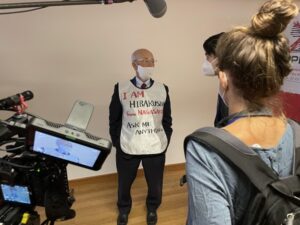 The engagement and meaningful participation of impacted people and young people was apparent throughout the 1MSP.
The engagement and meaningful participation of impacted people and young people was apparent throughout the 1MSP.
“I was heartened that the youth are so prominent in these spaces and were a part of the conversation,” said Sekou, who came with her nine-year-old son, Lion.
“Our future is not guaranteed until all nuclear-armed states are held accountable. We, the leaders of today, are committed in the work towards establishing a world free of nuclear weapons.” read the civil society statement drafted and delivered by youth representatives of the Middle East Treaty Organization (METO), which earned a vigorous and lengthy applause by parliamentarians and NGO activists swelling the main conference hall.
“We contributed to the drafting of the youth statement and that was a collaborative statement by various organizations’ youth sections and that was mostly to promote the active inclusion of youth within disarmament,” said Anahita Parsha, one of the METO youth drafters.
When asked whether the sum of events was successful, NYC-based ICAN organizer Seth Shelden, who was also active around the 2017 adoption of the treaty, said:
“Yeah, 100%. I mean, we adopted a declaration that was really powerful and succinct and says exactly what the state parties mean, with what their intent is with the treaty, which is to say… I can’t say it any less poetically than they did, which is to not rest until every nuclear weapon is eliminated from the earth. And then we adopted this action plan, which sets forward a way for how they’re going to go about doing it. It’s really ambitious.”
METO’s Parsa shared similar sentiment:
“The objectives were to get all of the states that have either signed the treaty or ratified the treaty in one place to review all of the work that’s been done so far, go over the treaty, kind of dismantle every section to see if there is any opposition– this kind of thing. I think it’s been pretty smooth. We had a really wonderful moment where the conference concluded, and everyone agreed. Some adoptions were made to change some of the sections of the treaty. A lot of it has to do with verification and compliance and making sure that now that the treaty is actually ratified into international law, states actually do start to abide by it.”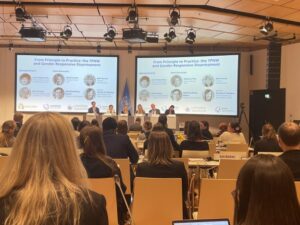
Seth Shelden is especially impressed about the solidification of commitments to impacted people and victims of nuclear weapons, many of whom have been at the forefront of this advocacy:
“We are building a framework to implement these provisions to provide assistance to the affected communities, people who have suffered from nuclear weapons user testing or environments that have been affected by nuclear weapons use and testing. We’re now building and operationalizing the first ever programs that are going to try and do something about past harm because the treaty is not only about preventing future harm but also past harm.”
A number of states became new parties to the treaty just prior to 1MSP, a few non-participating countries “observed” (in attendance) and some have expressed interest in joining, and the movement is expecting that momentum to continue as we prepare for the NPT Conference and First Committee meeting at the UN Headquarters in NYC, this fall.
“There’s a lot of work to be done in terms of what the next steps are because it’s very easy to sign a treaty like this into international law and then let it become far more symbolic than practical. So far there have been four or more observer-states here this year and the work is to see if we can get them to be signing or ratifying-states by the next one,” said METO’s Parsa.
Karlene Griffiths Sekou left the international event with a renewed purpose. “For me, it’s really, really important that I’m here not only to show that Black Lives Matter, but really to bring back to my constituency and the communities that I primarily anchor in and say, you know what? We have got folks, colleagues, comrades, folks in solidarity with our movement who are working on issues that we care about and that our movements are intersectional and there are no single-issue movements. Folks are anchoring in where they have fire and passion and a vision towards the bigger goal.”
When asked if he had a concluding message for nuclear armed states, ICAN’s Shelden responded, “We’re coming for your weapons. And no longer are we going to be bullied by this global order that tells us that these states don’t have a say.”
What you can do
During our interview, Seth Shelden provided specific steps that United States based abolition activists can take to further advance the effectiveness of the treaty and lay the ground for further adoption, transcribed in-full, below.
Okay, so we have several initiatives that help. It depends where you are and who you are, but if you can:
Talk to your local Congressperson. We have the Parliamentary Pledge. We have a bill in Congress, the Eleanor Holmes Norton Nuclear Abolition and Conversion Act, which asks the US to sign and ratify the TPNW. Ask them to co-sponsor, ask them to join ICAN’s parliamentary pledge.
Get your city, township, or municipality to join the Cities Appeal. That’s an initiative whereby all these cities, towns can commit to basically calling on the federal government to join the treaty and that’s really helpful. I mean, these things are super helpful because when we go to do universalization in other countries, they’re like, ‘What are you doing about nuclear armed states? What are you doing here… leave us alone… we don’t have nuclear weapons.’ Sometimes we have to help them see what we’re doing, why we’re doing it, and that they actually have support in the nuclear armed states, which they do.
Take forward divestment. We have a roadmap to help you divest your personal money, your institutional money, your retirement funds, your city’s funds, whatever your school’s funds. We have actually a report on schools on weapons, schools of mass destruction, which schools are involved in the industry, either in managing nuclear weapons facilities or in the pipe training pipeline for students to work on nuclear weapons. So, we should be seeing what you’re affiliated with and getting them out of that industry.
As the number of states parties continues to grow, further pressuring nuclear armed states and their allies to act on abolition, this Meeting of States Parties laid out the practical matters and process for implementation of the totality of the legally binding treaty, “until every nuclear weapon is eliminated from the earth.” Read ICAN’s Overview of the Vienna Declaration and Action Plan.

